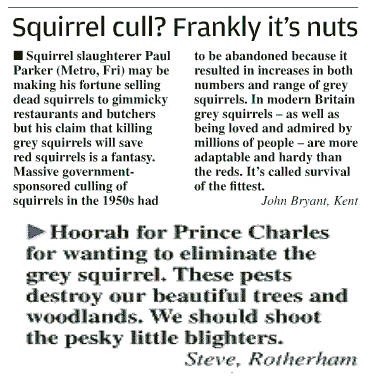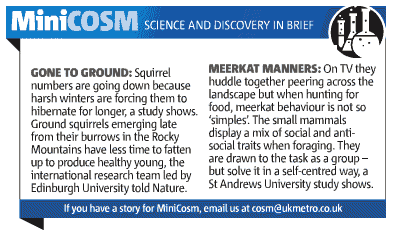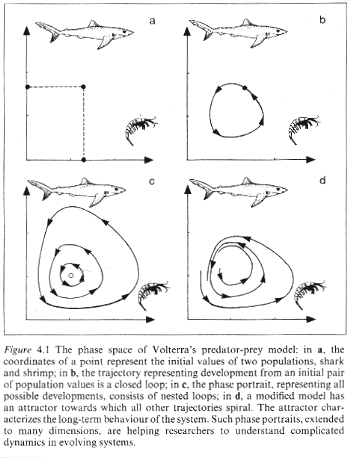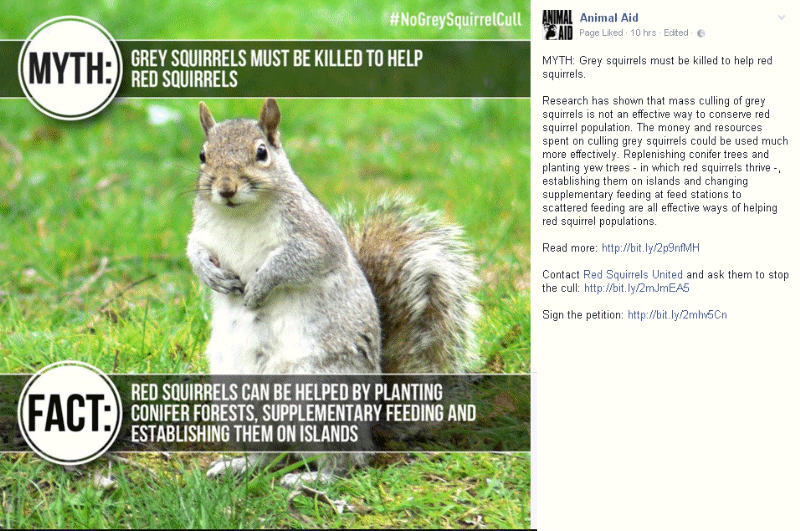A case for the Grey Squirrel
Read the myths about invasive
species
Myths
about grey
squirrels
9 little known facts about squirrels

I am concerned that there are views being expressed about grey squirrels being a pest and that they should be killed. (Along with pigeons,rats,lately crows,any other animal trying to survive the concreting of the green land for humans).
In my opinion it is not in the interests of a conservation organisation to be killing things- as it is a contradiction of the word "conserve". However, as with "invasive species" I recognise that sometimes there is a need to control populations - ie Balsam and Knotweed. With plants we imagine that there is no sentience of life and that there is no ethical problem of destruction,but this is not the case with mammals. The squirrel itself shows itself to be a very smart creature - the grey in particular showing exactly those qualities which Darwin we presume would have called "fittest" - that is - adaptability to environment,displaying intelligence and problem solving abilities (see CLEVER BEASTS- the squirrel shows its 'Mission Impossible' manoeuvres).
It maybe from time to time that a given mammal will intrude upon human concerns- this is certainly the case with elephants and tigers - who are now killed to the point of extinction and are being "conserved".
I do believe that the simple reaction of "killing" is massively uninformed - I have attached two images - the first is a couple of letters from the Metro - Steve represents the uninformed view - and John represents the informed view - both are on our site - and my own article on this will be along soon.
John's letter not only indicates the "survival of the fittest view" but shows the foolhardiness of thinking there are simple linear systems in nature - there are not - most systems are complex fedback dynamical systems - and these areas are what I have specialist knowledge of. The second image shows a "predator prey" model in phase space - I have this exact system of differential equations running at home on computer - I can tell you that the idea that you kill something and it stops a problem is just not true...which perhaps is obvious when we consider that the bees are dying- possibly from all sorts of other pro and con actions by human beings - some of which we imagine were done FOR their welfare.
 |
In other words nature has a way of controlling population. |
As John indicates in his letter, a previous cull - resulted in not less squirrels- but more - and over a wider range. The simple response of destroying something because it seems like it is damaging or detrimental is an unthought out response - analysis of natural systems has suggested that you can provoke a response that is not what you expected - in particular- Sir Robert May - who advised the government on policy - has written extensively on CHAOS THEORY (see my article Nature's Numbers and Biological Modelling in our ARTICLES section of the website) - and also Robert May's article.
(Those same equations are running on my computers). The upshot being that a simple anhihilation policy can be more destructive than it is helpful as it fails to account for the complexity of the situation.
I had a similar discussion with John Courtman about the destruction of Sycamore's over Oaks - we imagine that John is trained in ecological matters and of tree husbandry - and he explained to me that Sycamore's were liable to propogate Dutch Elm disease which could spread to other trees - and also that the Oak is a habitat for many creatures (we assume grey squirrels are one),and we presume that the Oak being a "traditionally English" variety, which seems under threat from other species is protected merely because it was here first.
I am unsure what John knows of population dynamics - but what I can tell you is I have studied it,and I am willing to bet that those who - like Steve,believe that Prince Charles is doing the right thing are perhaps as informed as Prince Charles is about dynamical feedback systems.
It seems to me that this subject is very much connected with the role of zoos and their propensity to give animals a rough life in prison as opposed to a free one "for their own protection" and to "conserve" them- the fact is - they only need conserving because HUMAN BEINGS are a threat to them and this planet - and at least one newspaper contributor suggested what no one likes to hear - why not cull a few human beings? They are the ones causing the damage - so I suggest to you - let those without sin,cast the first stone - how much damage have you caused lately? And if you were found wanting,because you were judged by an elephant or a tiger to be a threat- should you be killed? Or because you were smart and agile and capable,people sought to murder you- would you think it fair?
Would you not seek an aide to help you out and make your case?
Perhaps those people would be called "Conservationists" - apparently that's what we are- aren't we?
We are all here and have our roles and functions - please try to respect each others.
Chris Packham states:..."when it comes to the emotive issue of immigration plenty of people don't agree with such pragmatism, they are hell bent on cleaning up all the ‘non-native' scum and making Britain's countryside pure again, just like it was in the good old days. The thing is, when were the ‘good old days', when did they start and end? After all if we have to try and live in some sort of idealised time we must at least have some sort of programme to work to, however artificial. I've tried asking around but got no joy, the common perception still seems to be that everything living here when the land bridge to mainland Europe was inundated at the end of the last ice age is native, everything else non.
48% land mammal species in UK are non-native - pity that, because it immediately makes forty eight percent of our terrestrial mammal fauna non-natives, and so presumably if the Grey squirrels have to go then so do all the rabbits, hares, four of our six deer species and so on. That's going to be a bit expensive then, better put the helicopter gun-ships on standby, and of course it will leave us with a lot less mammals and completely balls up the communities of other creatures which have adapted to live with these ‘incomers' since they arrived. Mr Buzzard will miss those rabbits and I can't see Mrs Public being too happy about the extermination of Fallow deer and all their little Bambi's.
But I'm being silly of course we make exceptions for nice animals, it's only the horrible ones we want to ecologically cleanse.
Do you know what the rarest terrestrial mammal in Britain is? I often ask this question to audiences of the keen and committed and to date I've never had the correct answer from the floor. Otters, wildcats and Pine martens are favourite candidates along with polecats, the occasional oddity such as Water shrew and the inevitable bleeding dormouse.
I bloody hate Dormice
I bloody hate dormice; possibly our biggest conservation con and undeniably Britain's most boring animal. Strictly nocturnal and almost totally arboreal, they are invisible to every naturalist unless pulled out of a nest box by a licensed person. So that's a rewarding creature then. An animal that in a life times rambling will never show itself, the perfect choice for a conservation icon. Still there's always a good chance they'll be in the box because they sleep for five or more months of the year. That said perhaps Global Warming will inject a little more life into these boring things! And we've also recently discovered they're not that rare after all - we just couldn't find them! No, for me the only thing the Mad Hatter did wrong ... was forget to add the hot water! Oh, I know they've got lovely big whiskers, and lovely big eyes and lovely golden fur, but do you know what their most important asset is? It's a hairy tail! God help you if you are a rodent without a hairy tail, you can be Britain's rarest mammal but if your tail is naked - you're history!
A few years ago they were ‘removed' from the Isle of Lundy in the Bristol Channel. Except they weren't removed at all, lovable Tiggywinkle Hedgehogs are ‘removed' from the Hebrides, caught live and flown to nice new homes on the mainland after a massive public outcry at the very mention of the ‘cull' word.
The rats were just poisoned. I queried this action in print but was told by the then English Nature that they were a pest that were destroying seabirds, notably Puffins, and that they weren't native so they should be exterminated. I pointed out their rarity and the fact that we've got Puffins coming out of our ears on places such as the Isle of May and also inquired if we should start ‘removing' all the Little owls, Mandarin ducks and Capercaillies as these were introduced too.
I'm mad apparently. But at least I don't maintain double standards based on artificial and shallow ideas of cuddliness or outdated and embarrassing prejudice. I can forgive and forget about the plague (last reported epidemic in the UK, 1847), and I don't randomly pick who I welcome into our fauna based upon whether it eats gaudy seabirds or not. Anyway, the academics have got their sights set on some birds too".


"Do not kill the creatures [of the shore] in order to take them home.Dead animals make a poor sort of collection.Far better to watch them living in their own natural surroundings and to take home a mental picture of what they look like,aided if you wish by notes and sketches." - The Seashore GF Lamb M.A.
Wood on
the Wild side
Foxes
Survive even hunting
Richard
Dawkins on Specieism |
 |

